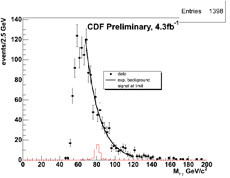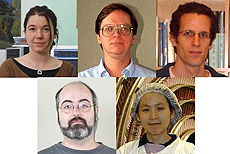Light probes matter

The top plot shows the measured isolated prompt photon cross section as a function of transverse momentum of the photon. The bottom plot shows the data in comparison to the theoretical prediction. The fact that the ratio of data to theory is approximately one indicates that they agree.
Our understanding of light has advanced dramatically since the ancient Greeks proposed that it consisted of rays coming from the eyes. Since then, ideas about light have evolved considerably, converging in the 20th century to the theory of Quantum Electrodynamics (QED).
Today, physicists working at Fermilab on the CDF experiment study photon production to further their understanding of Quantum Chromodynamics (QCD). QCD is a theory that describes the interactions of quarks and gluons, which are bound together to form other particles, such as the protons used in collisions at the Tevatron. The production rate, or cross section, of high-energy photons can be used to measure the quark and gluon densities inside of the colliding protons. Another important reason to measure the photon cross section is that photons can resemble new physics signatures, such as supersymmetry, the Higgs boson or extra dimensions.
The production of "prompt" photons (as opposed to those produced from the decay of other particles) at the Tevatron is an important probe of the properties of QCD. This is because photons are easy to identify, their energy is well measured, and the theoretical predictions involving the QED interaction of the photon are reliable. However, when looking at prompt photons, scientists are challenged by a large source of background events. Some particles ( π0 and η mesons) can decay into photons, but they are usually produced together with many other particles.
In order to manage these background events, physicists only select events where energy deposited around the photon candidate is small. In other words, they require that the photon is isolated in the detector. In addition, the isolation distribution is used to distinguish, on average, between prompt and decay photons. This provides a measurement of the purity of prompt photons in the data sample. Using these methods, CDF physicists have recently made a measurement of the isolated prompt photon cross section using 2.5 inverse femtobarns of data. The results were compared with the theoretical predictions of perturbative QCD and the data agreed well with our current best understanding of QCD.
Learn more

Top: Carolina Deluca, IFAE-Barcelon; Raymond Culbertson, Fermilab;
and Sebastian Grinstein, IFAE-Barcelona.
Bottom: Mario Martinez-Perez, IFAE-Barcelona; and Shin-Shan Yu, Fermilab.
-- Craig Group
|